BeiGene (BGNE) Announces Supplemental NDA for BRUKINSA in Waldenstrom’s Macroglobulinemia Accepted in China

Get Alerts BGNE Hot Sheet
Join SI Premium – FREE
BeiGene (NASDAQ: BGNE), a global, science-driven biotechnology company focused on developing innovative and affordable medicines to improve treatment outcomes and access for patients worldwide, today announced that the Center for Drug Evaluation (CDE) of the China National Medical Products Administration (NMPA) has accepted a supplemental new drug application (sNDA) for BeiGene’s BTK inhibitor BRUKINSA® (zanubrutinib) as a treatment for adult patients with Waldenström’s macroglobulinemia (WM).
“The sNDA acceptance is welcoming news, and following BRUKINSA’s recent NMPA approval for patients with WM in the relapsed or refractory setting, this represents an opportunity to expand access to more WM patients in China, subject to NMPA approval. As demonstrated in the ASPEN trial, BRUKINSA can offer an efficacious treatment option with improved safety in regard to certain cardiovascular events, such as atrial fibrillation, for patients with WM,” commented Jane Huang, M.D., Chief Medical Officer, Hematology, BeiGene. “The ASPEN trial has supported BRUKINSA’s approval for patients with WM in the U.S., Canada, Australia, and the European Union. We look forward to continued discussions with the CDE and the opportunity to bring this potential best-in-class therapy to more people in the WM community in China.”
The sNDA is supported by clinical results from the randomized, open-label, multicenter Phase 3 ASPEN trial (NCT03053400) comparing BRUKINSA to ibrutinib in patients with relapsed or refractory (R/R) or treatment-naïve (TN) WM.
As assessed by an independent review committee (IRC) based on the modified Sixth International Workshop on Waldenström’s Macroglobulinemia (IWWM-6) response criteria (Treon 2015), the combined rate of complete response (CR) and very good partial response (VGPR) in the overall intention-to-treat (ITT) population was 28% with BRUKINSA (95% CI: 20, 38), compared to 19% with ibrutinib (95% CI: 12, 28). While this difference was not statistically significant (p=0.09), BRUKINSA did achieve numerically higher VGPR rates and trends towards increased response quality.1
In the ASPEN trial, BRUKINSA demonstrated a more favorable safety profile compared to ibrutinib with lower frequency of certain adverse events, including atrial fibrillation or flutter (2% vs. 15%) and major hemorrhage (6% vs. 9%). Of the 101 patients with WM treated with BRUKINSA, 4% of patients discontinued due to adverse events, and adverse events leading to dose reduction occurred in 14% of patients.4
Serious News for Serious Traders! Try StreetInsider.com Premium Free!
You May Also Be Interested In
- BeiGene (BGNE) Receives EU Approval for Tislelizumab
- Petros Pharmaceuticals (PTPI) Expands Online Distribution for Prescription STENDRA
- Comcast (CMCSA) Business Expands Cybersecurity Portfolio with Managed Detection and Response
Create E-mail Alert Related Categories
Corporate News, FDARelated Entities
Twitter, FDASign up for StreetInsider Free!
Receive full access to all new and archived articles, unlimited portfolio tracking, e-mail alerts, custom newswires and RSS feeds - and more!



 Tweet
Tweet Share
Share Up)
Up)